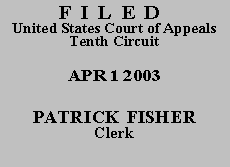

| MICHAEL S. STEVENS,
Plaintiff-Appellant, v. UNITED STATES OF AMERICA, Defendant-Appellee. |
|
Plaintiff Michael S. Stevens, proceeding pro se, appeals from an order of the district court dismissing this action, filed under the Federal Tort Claims Act (FTCA), 28 U.S.C. §§ 1346(b), 2671-2680. We affirm.
Mr. Stevens is serving a life sentence for conspiracy to commit offenses against the United States, unlawful transportation in interstate commerce of explosives, unlawful possession of explosives with intent to kill, injure, and unlawfully damage property, unlawful solicitation of another to engage in unlawful conduct, and damage by explosives. On July 14, 1998, he was assaulted by his cellmate. He timely filed his administrative claim on July 11, 2000. See Dahl v. United States, 319 F.3d 1226, 1228 (10th Cir. 2003) ("tort claim must be presented in writing to the appropriate Federal agency within two years after it accrues") (quotation omitted).
Mr. Stevens filed this action in federal district court July 13, 2000. He alleged prison officials had placed him in a cell with an inmate who was on single cell status because he was under investigation for killing another inmate a few months earlier. As a result of that cellmate's attempt to strangle him, Mr. Stevens alleged he suffered serious and permanent damage to his spine. He further contended that prison officials told other inmates he was a "baby-raper" in order to incite them to do additional harm to him.
Mr. Stevens' administrative claim was denied because he had failed to show any injury as a result of the alleged acts. The district court dismissed this action holding that it lacked subject-matter jurisdiction because Mr. Stevens had failed to exhaust his administrative remedies prior to commencing this action.
On appeal, Mr. Stevens argues that he did exhaust his administrative remedies and that further exhaustion was impossible and futile. He also asserts he was denied due process and the right of access to the courts because prison officials stole and waylaid his mail and inmate communication forms, stole his legal materials, threatened him with serious harm if he mentioned the attempted murder, and ignored his request for administrative remedy forms. Mr. Stevens concludes he should be compensated for his injuries.
"We review a dismissal for lack of subject-matter jurisdiction de novo, accepting the district court's findings of jurisdictional facts unless they are clearly erroneous." Montoya v. Chao, 296 F.3d 952, 954-55 (10th Cir. 2002).
Mr. Stevens filed this action in district court prior to exhausting his administrative remedies. His administrative claim was denied before the district court dismissed this action. However, the court concluded that the fact that he ultimately exhausted those remedies did not ripen his current action. We agree. We have held that even the filing of an amended complaint, an action Mr. Stevens did not take, does not serve to cure a prematurely filed original complaint. See Duplan v. Harper, 188 F.3d 1195, 1199 (10th Cir. 1999) (as general rule, premature complaint cannot be cured through amendment, instead, plaintiff must file new suit).
As "Congress intended to require complete exhaustion . . . before invocation of the judicial process," Mr. Stevens' action was properly dismissed for lack of subject matter jurisdiction. Id. (quotation omitted). The judgment of the United States District Court for the District of Kansas is AFFIRMED.
Entered for the Court
Circuit Judge
*. This order and judgment is not binding precedent, except under the doctrines of law of the case, res judicata, and collateral estoppel. The court generally disfavors the citation of orders and judgments; nevertheless, an order and judgment may be cited under the terms and conditions of 10th Cir. R. 36.3.